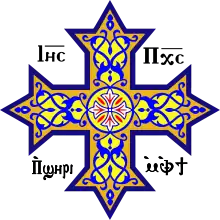ⲛⲓⲣⲉⲙⲛⲭⲏⲙⲓ `ⲛⲁⲙⲉⲣⲓⲕⲏ | |
|---|---|
| Total population | |
| c. 500,000 (2018 est.)[1] | |
| Regions with significant populations | |
| Northern New Jersey and the New York City Metropolitan Area;[2][3][4][5] as well as Southern California[2] | |
| Languages | |
| American English Mainly older people: Arabic (Egyptian Arabic, Sudanese Arabic, Libyan Arabic) Liturgical: Coptic language | |
| Religion | |
| Primarily Coptic Orthodoxy;[1][6] minority Coptic Catholic[7] |
Coptic Americans (Coptic: ⲛⲓⲣⲉⲙⲛⲭⲏⲙⲓ ⲛ̀ⲁⲙⲉⲣⲓⲕⲏ niremenkāmi enamerika) are American citizens of Coptic descent or persons of Coptic descent residing in the United States. As of 2018, there were some 500,000 Copts living in the United States.[1]
Immigration history

The immigration of Copts to the United States started as early as the late 1940s. After 1952, the rate of Coptic immigration from Egypt to the United States increased. The first Coptic church in the United States is St. Mark's Coptic Orthodox Church, which was established in the late 1960s in Jersey City.
As of 2013, researchers estimated that there were about 350,000 Copts who settled in the United States before the 2011 Egyptian revolution, with up to 100,000 additional Copts who settled in the U.S. after the revolution, fleeing instability and violence in Egypt.[2] Many came to the U.S. on grants of asylum.[2] The new post-2011 migrants to the United States included both educated middle-class Copts and poorer, more rural Copts.[2] As of 2018, it was estimated that a half-million Copts lived in the United States.[1]
The historic centers of Coptic American life have been in New York, New Jersey, and Southern California.[2]
In the 1990s, there were more than 50 Coptic congregations in the United States; by 2018, there were more than 250 Coptic congregations in the United States.[1]
Notable people
| Lists of Americans |
|---|
| By US state |
| By ethnicity or nationality |
|
This is a list of notable Coptic Americans, including both original immigrants who obtained American citizenship and their American descendants.
- Nader Anise, founder of Coptic American Chamber of Commerce (Coptic Chamber) and attorney
- Halim El-Dabh, composer and ethnomusicologist
- Fadi Chehade, founder of RosettaNet
- Gamal Helal, retired interpreter and diplomat
- Raymond Ibrahim, author and commentator
- Magdi Khalil, commentator
- Marty Makary, scientist and author
- Rami Malek, actor
- Emil Michael, businessman, former vice president of Uber
- Michael Mina, award-winning chef and restaurateur
- Dina Powell, former Deputy National Security Advisor
- Morris Sadek, attorney and activist
- Fayez Sarofim, billionaire and heir to the Sarofim family fortune
- Matthew Shenoda, poet, writer, and professor
- Bassem Youssef (FBI agent), Unit Chief in the FBI’s Counterterrorism Division
- Nabih Youssef, structural engineer
See also
References
- 1 2 3 4 5 Shira Telushkin, The Americanization of an Ancient Faith, The Atlantic (March 28, 2018).
- 1 2 3 4 5 6 Wallace, Bruce (January 4, 2013). "Amid Instability In Egypt, Coptic Christians Flee To U.S." All Things Considered. NPR.
- ↑ "Yearbook of Immigration Statistics: 2012 Supplemental Table 2". U.S. Department of Homeland Security. Retrieved 2013-04-01.
- ↑ "Yearbook of Immigration Statistics: 2011 Supplemental Table 2". U.S. Department of Homeland Security. Retrieved 2013-04-01.
- ↑ "Yearbook of Immigration Statistics: 2010 Supplemental Table 2". U.S. Department of Homeland Security. Retrieved 2013-04-01.
- ↑ Lily Kuo, Coptic Christians live quietly in New Jersey town, Reuters (September 14, 2019).
- ↑ Estefania Aguirre, New Coptic Catholic leader receives Pope's approval, Catholic News Agency (January 18, 2013): "The Coptic Catholic Church was established in 1824 and there are five parishes in the United States and in Canada."
